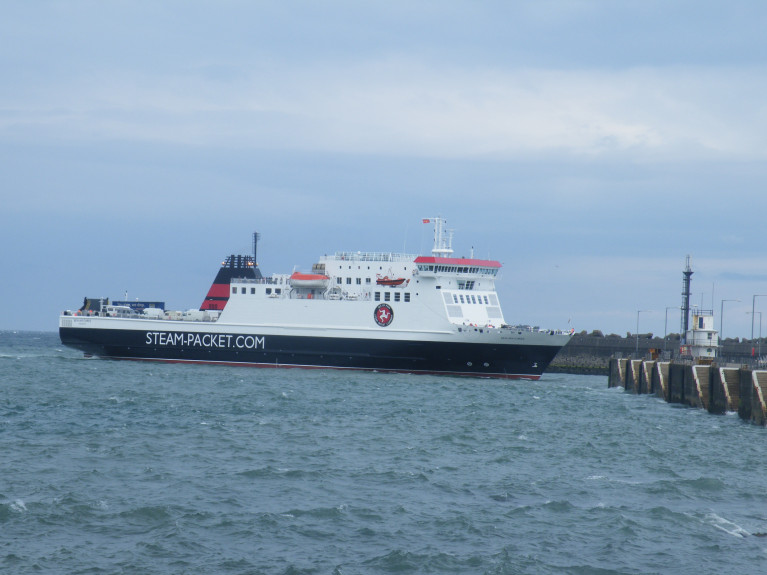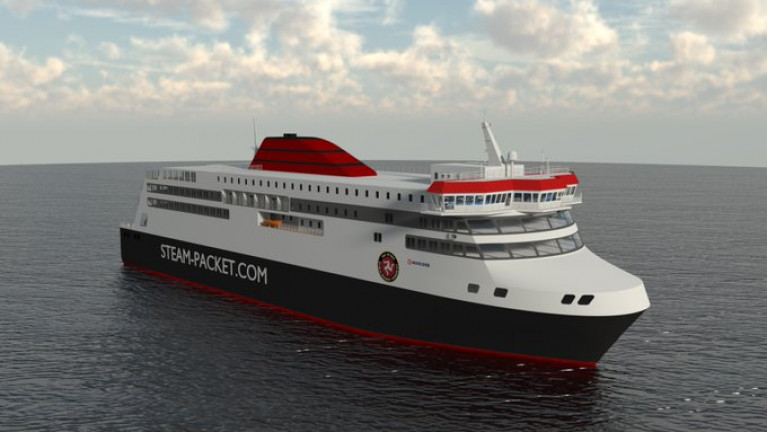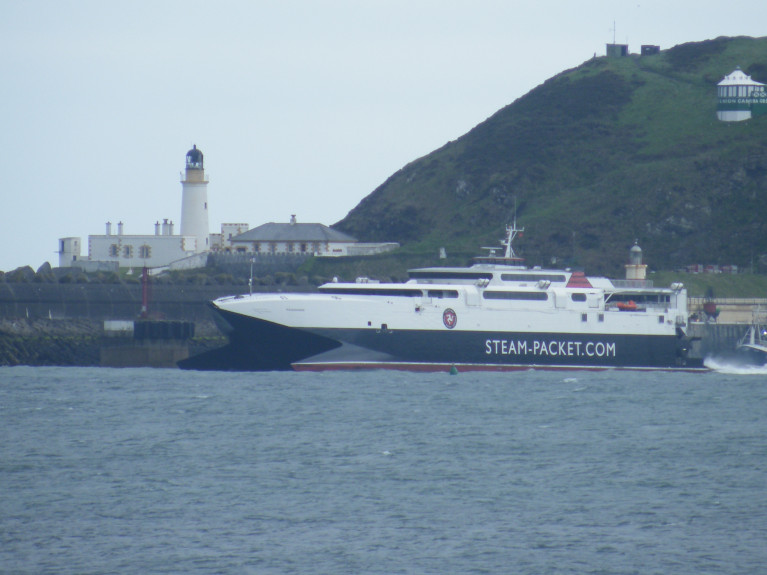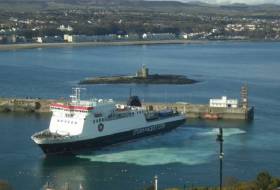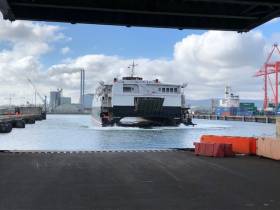Displaying items by tag: IOM SteamPacket
First Profit for Isle of Man Steam Packet Since Pandemic
A return to profit for the Isle of Man Steam Packet Company has been recorded for the first time in three years.
The ferry operator currently with a fleet of four, which became owned by the Manx government in 2018, made an £11m profit in 2022, following a £3.2m loss the previous year.
The double digit profit figure represents a significant upturn in the Steam-Packet's fortunes, which at the peak of the Covid-19 pandemic in 2020, saw a loss of more than £10.5m.
Such losses had stemmed from border closures during the pandemic. In addition the need to provide freight services so to enable essential lifeline supplies during that period.
It is now almost 17 months since the remaining Covid restrictions were lifted on 1 April 2022.
BBC News has more on the Steam Packet's directors' report and including in the same year when the company acquired the relief ro-ro freight vessel MV Arrow for about £8m.
New Flagship Ferry Manxman Undertakes First Sea Trials in South Korea
The new flagship of the Isle of Man Steam Packet Company the Manxman, has undergone its first sea trials in South Korea.
The newbuild set sail from the port of Ulsan from where the Hyundai Mipo Dockyard built the ferry. Among the tests involved the propulsion equipment, controls, mooring, navigation, radio and anchor equipment.
Manxman is to continue with further trials which will take place nearer to the newbuid's completion which will test stabilisers, speed and levels of sound and vibration.
Following completion as Afloat previously reported the Manxman will embark on an 18,000 mile delivery voyage to the Isle of Man. This is expected to take 30 days with a transit through the Suez Canal.
Click ManxRadio which also has a video of Manxman underway.
It is hoped that the ferry can enter service ahead of the 2023 TT Festival.
Sailing Disruption As Isle of Man Ferry is to Require Repairs
Sailings to and from the Isle of Man will be disrupted at the end of the month as the ferry Ben-my-Chree undergoes repairs.
The ferry operator, the Isle of Man Steam Packet Company said the (fastferry) Manannan would undertake daytime crossings between Douglas and Heysham from 30 October.
Due to the "scope and complexity" of the work needed, the Ben-my-Chree would be at Cammell Laird's (shipyard) facility for six days, the firm added.
Overnight freight sailings would be carried out by MV Arrow.
The vessel, which had been held on a long-term lease, was recently bought by the ferry firm as Afloat previously reported on the 84 trailer unit capacity freighter.
As a result of the changes, usual evening passenger sailings from the island to Lancashire, and the overnight return will not take place.
More from BBC News including an apology from the ferry operator due to the disruption.
The Manx state-owned ferry operator, the Isle of Man Steam Packet Company lost tens of millions of pounds in revenue in the first year of the Covid pandemic.
Significant losses to both passenger and freight revenues are outlined in the directors’ report and financial statement for the year ending December 31, 2020, which will be laid before this month’s Tynwald sitting.
It says the government’s decisions to cancel the TT and Festival of Motorcycling in 2020 and 2021, and to impose travel restrictions on all visitors, had a very significant effect on passenger revenues and cashflows.
Thirty-five weeks of Covid-related travel restrictions in 2020 resulted in the loss of about £25m passenger revenues including the cancellation of both that year’s TT and Festival of Motorcycling.
Isle of Man Today has more on the story.
New Isle of Man Vessel Will 'Usher in New Standard' for Ferry Travel
The Isle of Man Steam Packet's managing director claims a new flagship vessel will usher in a new standard of ferry travel.
Construction is underway on the Manxman, (see: Shipyards steel-cutting ceremony) and which is expected to start operating in 2023.
The newbuild ro-pax will replace the Ben-my-Chree and with the project costing around £78m.
Brian Thomson says the new ferry will be an exciting upgrade.
ManxRadio also has a podcast on what the MD has to say.
Ferry 'season' services by fastcraft to and and from the Isle of Man are delayed due to the continued closure of Manx borders (see info to non-island residents, etc).
The delays announced earlier this month by the Isle of Man Steam Packet Company, affect the start of fastcraft Manannan’s season.
As the Manx borders remain closed, Manannan will no longer start serving seasonal services on Thursday 25th March.
The ro-pax Ben-my-Chree, however is to continue operating lifeline freight and passenger services between Douglas and Heysham.
Daily Ben-my-Chree services to and from Heysham will continue, with Manannan and freight-ferry Arrow due to cover the Ben-my-Chree’s overhaul period scheduled for mid-April.
All passengers booked on Manannan sailings up until Tuesday 25th May inclusive will be contacted and offered a full refund or a transfer to Heysham services as appropriate. Fast craft sailing schedules will remain under regular review.
The operator's chief executive Mark Woodward said: ‘Since the start of the pandemic, we have been dedicated to maintaining lifeline links between the Isle of Man and the UK, and have provided excess freight and passenger capacity throughout this period. Manannan is being dry docked in March so that she will be ready to operate as soon as the border re-opens. In the meantime, we will continue to transport essential food and goods to our Island community.’
Sailings beyond 25th May will continue to be monitored and may also be subject to change, depending on Isle of Man Government travel restrictions.
All affected passengers will be given advance notice of schedule changes.
Operator Isle of Man Steam Packet says it's looking for a Senior Master to help oversee a planned new company vessel.
As Manx Radio reports, the current flagship, Ben-my-Chree was launched in 1998. It's envisaged the ropax ferry may become the back-up vessel in the fleet with the new ship becoming a replacement.
An advert placed by the Steam Packet reads that the successful person will "assist with the successful delivery of the new company vessel and manage that vessel for the foreseeable future. Applicants for the positions should have new build or shipyard experience and be able to travel to wherever the vessel is being built.
The company has agreed under the new sea services arrangement to provide two new vessels, with first being due to come into service in 2022.
There's no indication where the ship may be built, though Cammell Laird on Merseyside have indicated they would be eager for Manx business.
There's been no formal confirmation from the operator currently on their plans for a new ship.
#ferries - Manx Radio reports of a political party that says the Island's public could buy shares in the Isle of Man Steam Packet to benefit from government's nationalisation of the company.
The idea has been floated by LibVan as a way of letting the Manx people have a direct stake in the investment, which cost the taxpayer £124 million.
Government bought the company last year from Banco Espirito Santo, and last month Tynwald approved new 'Heads of Terms' for the Sea Services Agreement.
To read more on the story and to listen to LibVan party member, MHK Lawrie Hooper click the link here to the radio's podcast.



























